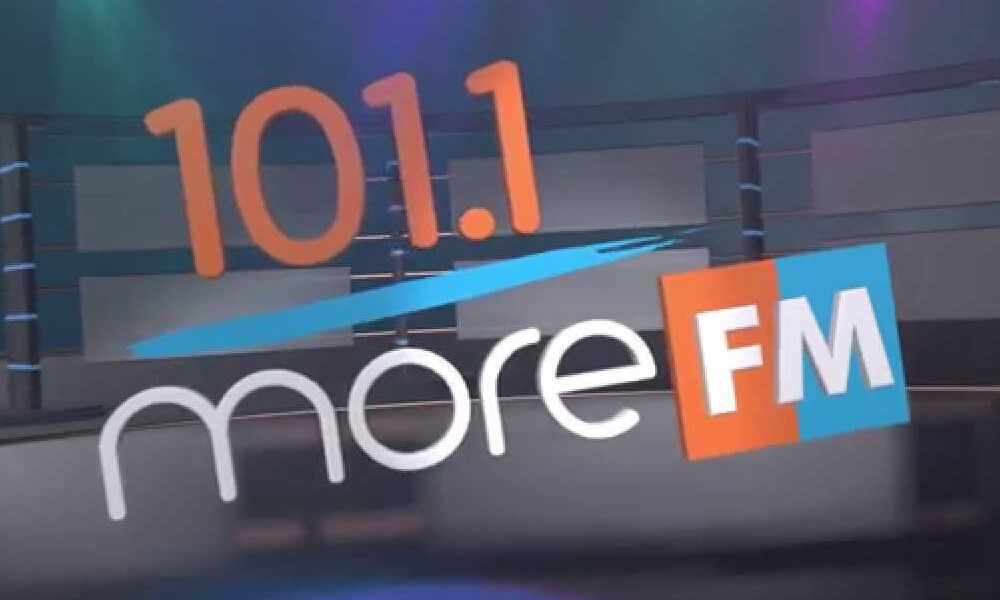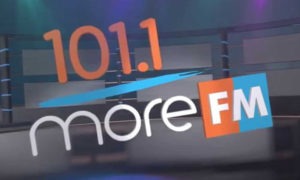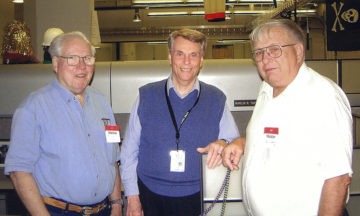This is an encore of a two-part radio station story titled “The End of an Era” … which refers to what occurred in the Summer of 2018, when I originally published this commentary. It is about Philadelphia’s FM station located at 101.1 on the dial. It had just celebrated its 55th birthday and had been under the same ownership/management team through all those years.
The station had just been sold to group owner Entercom, now known as Audacy. While this article was written shortly after the change of ownership, the “handwriting on the wall” was readily visible; you see, Entercom had previously absorbed the CBS-owned radio stations, some of the most successful and profitable stations in the country . . . and was already in the process of running them into the ground. And, the days ahead were nearly as bleak for MoreFM.
In Part Two below, I’ll share the beginning days, when it was known as WDVR and Jerry Lee and I worked as a Dynamic Duo to quickly launch the station into a leadership position on the Philadelphia area radio dial … a spot it would hold for much of the next 55 years!
The End of an Era!
If you have any current connection with the radio industry or live in greater Philadelphia, you are likely aware of the announcement late last week that the station currently known as 101.1 MoreFM has been sold by Jerry Lee Radio to radio station group owner Entercom, headed by one David Field, which already owns several stations in the Philadelphia market.
Radio stations across the nation are bought and sold all the time … what’s different in this situation, with Philly.com, the Philadelphia Inquirer’s website calling it the “Crown jewel of Philadelphia radio?” And why is it the “end of an era?”
You hear this term used quite frequently in so many different situations, so read on and I’ll explain …
It was 55 years ago this past May that this station began broadcasting … not a long time in radio broadcasting history when you realize that the first two radio stations in America — KDKA in Pittsburgh and WWJ in Detroit — went on the air in 1920, 103 years ago!
But, back to the story at hand and what makes this one so different and being declared “the end of an era” …
The station was built and owned by David L. Kurtz, who was an electronics engineer with no background in broadcasting but who had a sincere desire to own a radio station. You’ll find much of this “early days” story in my memoir, RADIO … My Love, My Passion.
With Dave hiring Jerry Lee as sales manager, and your truly as station manager and program director, the station began operations as WDVR in May 1963. In the 1980’s the call letters were changed to WEAZ and called itself “Easy 101.” The station later became WBEB upon changing format, using the B101.1 as its handle prior to re-imaging as 101.1 MoreFM, which is meant to instill the mindset that the station delivers MORE, more music, more everything!
Early on, Jerry Lee had worked out a plan with Dave that, based on meeting certain annual revenue and profit targets, Jerry would be granted a piece of the ownership … up to 49%. It was at that level when in 2005, Dave Kurtz passed away after a battle with cancer, leading Jerry to take the only logical step, acquire the remaining 51% of the ownership from Dave’s widow Esther. However, in doing so, he took on a huge amount of debt, something on the order of 65 million dollars.
With the downturn in the economy in the following years, leading to a reduction in advertising spending, it became harder for Jerry to meet the required payments and, finally, in the fall of 2015, he was unable to continue to meet the obligations and the lenders took control of the station. A new CEO, Jim Loftus, was appointed, but Jerry remained as the titular head of the station and no significant changes in any aspect of the station were made … with the concepts that have brought it dramatic success and Philadelphia market leadership over the past many years being retained.
Truly the End of an Era
This means that the station, since its beginnings over 50 years ago, had been under the ownership of just two individuals, neither of which owned other stations and both were personally involved in station operations — the last remaining “standalone” major market radio station anywhere in America … truly making its current sale ‘the end of an era.”
The giant question mark now is that with WBEB going into the hands of a major station group … what will they do to, or with, it? Buyer Entercom’s operating philosophy tends to be 180 degrees out of phase with Jerry Lee’s “more” approach of spending more on promotion and delivering the best product possible, which led to delivering more revenue and profits! Which approach will prevail going down the road? Time will tell.
Jerry Del Colliano, who writes a daily commentary examining current industry happenings, addressed this ownership change earlier this week. The tart headline may give you a clue as to his view of the deal:
“Less FM For Entercom. David Field is the polar opposite of Jerry Lee … a cheapskate.”
Read Jerry’s entire commentary here.
PART 2: May 1963, The Beginning
I still wonder what Dave Kurtz was thinking … what was his plan of action once WDVR was built? As I write in my memoir – after meeting with him in his home, he took me to the facility … it was ready to broadcast except for one thing … it needed a staff — people to create programming and operate it.
How long had it been in this completed stage, sitting there ready to be “fired up?” Had others contacted him or had he begun to search for someone to manage and program the station? I have no answers.
Next, just how providential was it for both Jerry Lee and Marlin that, in early 1963, I would be seeking a new opportunity … with Philadelphia being a logical place to look, as it was quite familiar territory, since I grew up just to the north in Bucks County, Pennsylvania?
First, while Dave had some thoughts about programming, there was no indication that he had anyone in mind to hire — as once he learned that I had two years earlier put a new station on the air in the Washington, D. C. area (WHFS), I was hired on the spot. And then, why would Jerry Lee just happen to visit WHFS the following week and find that the person he met there would shortly be moving to Philadelphia to manage the launch of a new FM station, WDVR?
That’s all the information Jerry needed … it wasn’t much more than 48 hours later that I received a call from Jerry saying, “Marlin, we’ll be working together in Philadelphia!”
There’s a lot to learn from Gerald D. Lee … universally known as Jerry Lee. First of all, understand that you gotta do what you gotta do in order to succeed.
Jerry Lee never liked working as a “street salesman,” but the only way to get the new FM station that we were responsible for launching off the ground and generating income to pay the bills was to have advertisers. With Jerry being hired as Sales Manager and there being no budget to hire others to do the selling, it was Jerry’s job.
One by one, he’d bring another client in the door. First, John B. White Ford and the Consumer Products Division of the Philco Corporation as co-sponsors of the all-night program, to require that we’d be a 24-hour-a-day operation. Then, Aaron Levin’s Galleries on the Mall, Mikolosky Windows & Doors, Burdumy Motors, C. A. Rowell Department Store … just a few that I can remember.
While I pretty much grew up with a “Can Do” attitude … seeing Jerry in action confirmed that staying pro-active and constantly on the offensive were keys to a meaningful and effective life! If you need proof, just take a look at the 55-year track record of the station at 101.1 on the FM dial in Philadelphia.
The headline in an article about him published in The Pulse of Radio in 1992, read:
Jerry Lee – Futurist
There’s no question that Jerry was and is a promoter, pure and simple! And, yes, he’s a Futurist … a person who studies the future and makes predictions about it based on current trends and conditions. I would also add … always looking down the road to see what challenges and opportunities lay ahead, then utilizing your assets to most effectively counter-act or benefit from them.
In response to a question recently posed to him by a Radio Ink editor, Jerry stated:
“I was never the day-to-day guy from the beginning of the station, basically. As soon as I could afford to hire a GM, I did. That GM ran the station. My job was to come up with ideas. That has been my job my whole life.”
A sub-headline in that Pulse of Radio article reads: “Learning about our Future by Looking at our Past.” This is the primary reason I wrote my memoir, RADIO … My Love, My Passion — I believe that enough unique and innovative things transpired during my radio industry career to make it beneficial reading for those who are young in their radio journey or hope to soon begin one in this industry which is crying out for enthusiastic and creative minds.
While Jerry’s future will not include a radio station, he’s not abandoning radio. He’s on a mission — which is desperately needed — to educate the industry on how to produce more effective commercials, which will produce better results for their advertisers, hence allow stations to charge more per commercial unit … ultimately permitting them to earn a profit while airing fewer commercials per hour, so necessary for radio’s future survival.
Until the sale was consummated, the station continued without changes, following the Jerry Lee concepts of when you spend on promotion and delivering a quality product, you reap a greater return — through which the station and Jerry have earned millions … and he’s used those monies to support numerous worthy causes; whereas, the David Field approach is 180 degrees opposite of that.
P. S. – Yes, I did enjoy driving one of Jerry’s Cadillacs during my 10-month stay back at WDVR in 1968 and early ’69 before heading off to New York City.








Thank you Marlin. Indeed the end of an era! I look forward to reading Part Two.
Please wish Mr. Lee my best.
Dick O’Connor
Thanks Marlin for the look at Phioladelphia Radio. Back when I was commuting to Army Reserve drills in the 1990’s either at Fort Dix, NJ or on Woodhaven Road in Philadelphia my go to radio station for traffic and weather information was KYW.
Marlin, I’m sure you know this, but in addition to spending more on promotion and delivering the best product possible, Jerry Lee was reputed to have spent a lot on research, and that also paid off for the station in terms of increased revenue. Of course, spending money to make money is a foreign concept to the consolidators.
There’s no question, Roddy, that Jerry was a master promoter … and research certainly plays a role.
Jerry is the only person in the radio industry that I’m aware of who delved deeply into researching/studying the content and structure of commercials for their effectiveness in communicating the advertiser’s message.